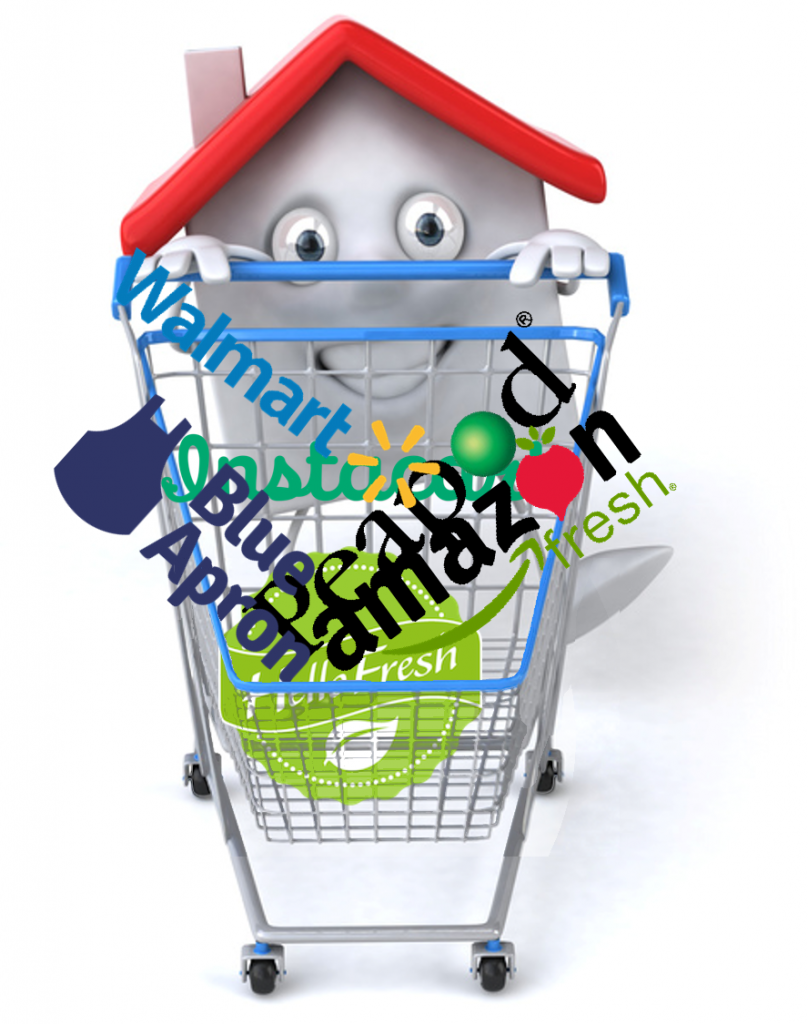“It’s been clear for a while,” writes Bill Bishop (@BrickMeetsClick), Chief Architect at Brick Meets Click, “that a wide range of shoppers would like to do at least some of their grocery shopping online — not just folks who physically can’t get to the store, but this group includes Millennials, busy moms, young professionals, Baby Boomers and the list goes on. It’s safe to say demand for online grocery shopping is strong and growing.”[1] Bishop wonders why we are still debating the future of online grocery shopping. He suspects there might be a bit of paralysis by analysis. He explains:
“Until recently, the doubters could argue it would take millions of dollars just to get started with online grocery, and even that wouldn’t guarantee success. Now, however, retailers have a much wider set of options for offering their customers a way to shop online. Curiously, so many choices seem to be generating a kind of fog that confounds the debate and blurs where the disruptions are coming from specifically and what the best path forward is.”
Janet Forgrieve (@JFo360) isn’t as certain as Bishop about shoppers’ enthusiasm for online grocery shopping. “Consumers who think nothing of ordering their books, clothes and shoes online still often balk when it comes to buying their groceries anywhere but the store,” she writes.[2] Like Bishop, however, Forgrieve does believe that retailers and shoppers will eventually come around. “The costs and the logistics involved in delivering perishable consumables has kept the food and beverage sector lagging other e-commerce efforts,” she explains, “but flexibility, personalization and omnichannel strategies are helping grocers catch up.”[2] To be fair, the success of online grocery shopping depends on a number of factors that can significantly affect business models and profitability. One company that seems to be doing well is Ocado, which is based in the United Kingdom. Sam Chambers (@SamChambersDMC) reports, “At Ocado Group Plc’s warehouse in Hatfield, a half-hour north of central London by train, hundreds of red shopping crates wind their way through a labyrinth of conveyor belts. The plastic crates make a series of pit stops where workers fill them with any of 45,000 different products in the warehouse: corn flakes here, oysters there, bananas farther along. The crated groceries are then loaded into vans in time to make it to homes across Britain within a one-hour window. The sophistication of the operation has many investors betting that the most important product for Ocado — the world’s biggest online grocery specialist — might not be food, but technology.”[3] Ocado’s Chief Executive Officer Tim Steiner told Chambers, “[Ocado’s system offers] better operational efficiency than anything that’s been launched globally.” The company is pinning its hopes for the future on being able to license that technology to other firms around the world. Bishop notes, however, that various business models abound. He explains:
“It seems like there’s a new player in the online grocery space every time you turn around these days. Fairway Market and Gelson’s Markets announced that they’ve signed on with StorePower.com, a new division of Abe’s Markets, the online natural and organic food retailer. We’ve been exchanging information with a new mobile app called Grability. Platforms like GrocerKey and Foodie are attracting more shopper attention, and online marketplace Artizone has started to offer ‘delivery in 60 minutes.’ Add to this the growing energy around online meal subscription programs like HelloFresh, Blue Apron and Plated — and the overwhelming response Shipt experienced when it launched in Tampa, Fla. — and it becomes obvious that shoppers have an almost overwhelming choice of ways to buy food and groceries online.”
Chambers notes that Instacart offers “a low-tech, Uber-esque alternative [to Ocado’s sophisticated technology]: Instead of building warehouses and shipping operations, the company simply hires personal shoppers. Customers place an order from their favorite grocer via an app; one of Instacart’s 10,000 shoppers goes to a store, picks up the goods, and delivers them. Instacart is valued at $2 billion — roughly two thirds of Ocado’s market capitalization — and already counts Costco, Safeway and Whole Foods among its partners.” Just because a business model is low-tech doesn’t mean it can’t experience financial problems. In March, Greg Bensinger (@GregBensinger) reported Instacart was “cutting the fees it pays couriers who shuttle groceries in several cities, the latest Silicon Valley on-demand startup trying to contain costs in a tightened funding environment.”[4] Bensinger added, “Other startups with apps that summon contractors to deliver food, run errands or give rides are scrambling to maintain their business models. The companies say pay should increase over time as they bundle more orders into each route.”
If you don’t like “Uber-esque,” do what Walmart has done — partner with Uber directly. Sarah Nassauer (@SarahNassauer) reports, “Wal-Mart Stores Inc. will test a grocery-delivery service with Uber Technologies Inc. and Lyft Inc., part of the retailer’s growing efforts to compete head on with Amazon.com Inc.”[5] The test project will be conducted in Phoenix and Denver. Walmart’s latest test follows a “similar pilot program in Miami earlier this year, [which involved] partnering with the delivery startup Deliv to provide groceries and other products from Sam’s Club.”[6] Nassauer adds, “Under the pilot program with Uber and Lyft, a shopper can place a grocery order online and then Wal-Mart employees will select the merchandise and package the order. Wal-Mart will then hail an Uber or Lyft driver to pick up the order and deliver it to the customer’s location. The delivery will cost $7 to $10, and customers will pay Wal-Mart, not the drivers.” One thing most online grocery services have in common is that they serve urban locations. Shopper density and convenience are important factors for success. The exception to the urban preference is the online meal subscription programs mentioned by Bishop. Because they use refrigerated packages, most subscription packages can service both urban and rural areas and can use the U.S. Postal Service.
Kim S. Nash (@knash99) believes that online grocery shopping is going to be one of the next big e-commerce battlegrounds.[7] With companies like Walmart, Amazon, Ocado, and Peapod competing for business, Nash could be correct. Nassauer adds, “Last-mile delivery has proved a hotly contested battleground. Dozens of startups like Instacart Inc. and DoorDash Inc., the U.S. Postal Service, Uber and Amazon are all vying for accounts with retailers, restaurants and grocery stores to bring goods to people’s homes.” Walmart’s direct challenge to Amazon in the online grocery arena is probably the tipping point that guarantees online grocery shopping is here to stay. Business models still need to be sorted out to ensure profitability; but, convenience and flexibility should draw more and more shoppers to take advantage of such services as the urbanization trend continues.
Footnotes
[1] Bill Bishop, “Why are we still debating online grocery?” Supermarket News, 25 August 2015.
[2] Janet Forgrieve, “Flexibility, personalization drive online grocery growth,” Smart Brief, 27 July 2015.
[3] Sam Chambers, “The Freshest Thing About the World’s Biggest Online Grocer Isn’t Food,” Bloomberg, 28 August 2015.
[4] Greg Bensinger, “Grocery-Delivery Startup Instacart Cuts Pay for Couriers,” The Wall Street Journal, 11 March 2016.
[5] Sarah Nassauer, “Wal-Mart to Test Grocery Delivery With Uber and Lyft,” The Wall Street Journal, 3 June 2016.
[6] Staff, “Walmart Partnering With Uber, Lyft and Deliv to Test Grocery Delivery Service,” Supply Chain 24/7, 3 June 2016.
[7]Kim S. Nash, “Online Groceries Becomes Next E-Commerce Battleground,” The Wall Street Journal, 1 April 2016.





